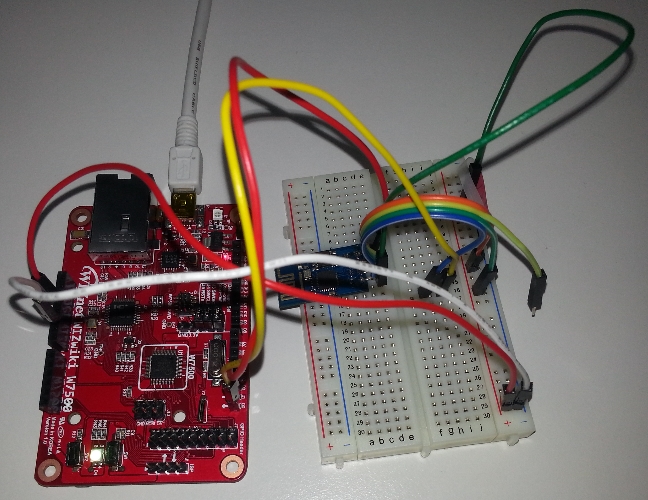ESP8266 test with W7500. You can monitor UART Tx/RX of ESP8266.
Dependencies: ESP8266Interface
Fork of ESP8266_Test by
I tested ESD-01(ESP8266 module) with WIZwiki-W7500 platform as below.

You can see the all log of this test as below. And with this ESP8266Interface class, you can monitor Tx/Rx of ESP8266 module UART.
WIZwiki-W7500 with ESP8266 Test. AT OK AT+RST OK ets Jan 8 2013,rst cause:4, boot mode:(3,6) wdt reset load 0x40100000, len 612, room 16 tail 4 chksum 0x12 load 0x3ffe8000, len 788, room 4 tail 0 chksum 0x50 load 0x3ffe8314, len 264, room 8 tail 0 chksum 0x4a csum 0x4a 2nd boot version : 1.1 SPI Speed : 40MHz SPI Mode : QIO SPI Flash Size : 4Mbit jump to run user1 s ready AT+CWDHCP=1,1 OK AT+CWMODE=1 OK AT+CWJAP="WizFiDemoAP","12345678" OK AT+CIPSTART="TCP","192.168.3.64",8000 CONNECT OK AT+CIPMODE=1 OK AT+CIPSEND >AT+CIPCLOSE CLOSED OK
Diff: main.cpp
- Revision:
- 12:4e8842ddee84
- Parent:
- 9:91fe783e1dd4
--- a/main.cpp Fri May 01 18:29:45 2015 +0000
+++ b/main.cpp Tue Jul 14 09:13:03 2015 +0000
@@ -1,35 +1,66 @@
#include "mbed.h"
#include "ESP8266Interface.h"
#include "TCPSocketConnection.h"
-
-const char* ECHO_SERVER_ADDRESS = "192.168.2.4";
-const int ECHO_SERVER_PORT = 8080;
-ESP8266Interface wifi(D1,D0,D10,"demossid","password",115200); // TX,RX,Reset,SSID,Password
-RawSerial pc(USBTX, USBRX); // tx, rx
-
-int main() {
+
+
+RawSerial pc(USBTX, USBRX); // tx, rx
+
+DigitalOut led1(LED1);
+DigitalOut led2(LED2);
+
+const char* TEST_SERVER_ADDRESS = "192.168.3.64";
+const int TEST_SERVER_PORT = 8000;
+
+ESP8266Interface wifi(D1, D0, D2, "WizFiDemoAP","12345678",115200); // tx, rx
+
+
+// For monitoring data from ESP8266
+Timeout timer_buffer_debug;
+CircBuffer<char> buffer_ESP8266_recv(1024);
+
+void print_buffer_ESP8266()
+{
+ char c=0;
+ while ( buffer_ESP8266_recv.available() ) {
+ buffer_ESP8266_recv.dequeue(&c);
+ pc.putc(c);
+ }
+ timer_buffer_debug.attach(&print_buffer_ESP8266, 0.1);
+}
+
+
+int main()
+{
+ // LED Blink
+ for (int i=0; i<5; i++) {
+ led1 = 1;
+ wait(0.1);
+ led1 = 0;
+ wait(0.1);
+ }
+
pc.baud(115200);
- wifi.init(); //Use DHCP
- wifi.connect();
- pc.printf("IP Address is %s\n", wifi.getIPAddress());
+ pc.printf("\r\nWIZwiki-W7500 with ESP8266 Test. \r\n");
+
+ timer_buffer_debug.attach(&print_buffer_ESP8266, 0.5);
+ bool result;
+ wifi.init();
+ result = wifi.connect();
+ if ( !result ) {
+ pc.printf("wifi.connect error\r\n");
+ return 0;
+ }
+
TCPSocketConnection socket;
- while (socket.connect(ECHO_SERVER_ADDRESS, ECHO_SERVER_PORT) < 0) {
- pc.printf("Unable to connect to (%s) on port (%d)\n", ECHO_SERVER_ADDRESS, ECHO_SERVER_PORT);
+ while (socket.connect(TEST_SERVER_ADDRESS, TEST_SERVER_PORT) < 0) {
+ pc.printf("Unable to connect to (%s) on port (%d)\n", TEST_SERVER_ADDRESS, TEST_SERVER_PORT);
wait(1);
}
-
- char hello[] = "Hello World\n";
+
+ char hello[] = "Hello World\r\n";
socket.send_all(hello, sizeof(hello) - 1);
-
- char buf[256];
- int n = socket.receive(buf, 256);
- buf[n] = '\0';
- pc.printf("%s", buf);
-
socket.close();
- wifi.disconnect();
-
+
while(true) {}
}
-
\ No newline at end of file
